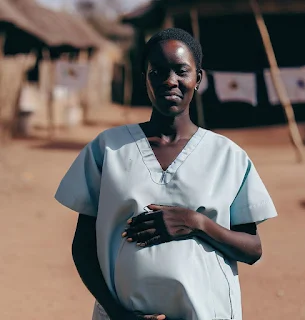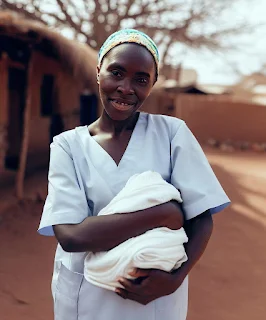A Midwife's Tale: Redemption, Healing, and the Power of Forgiveness is a story about the celebration of life, birth, and the vital role midwives play in ensuring safe deliveries.
Ebrima, a Midwife Story.
In a time before written memory, in the small village of Wassu in The Gambia, there lived a remarkable woman named Ebrima.
Ebrima was a skilled midwife known throughout the village for her exceptional ability to safely deliver children into the world. Her hands were gentle, her knowledge vast, and her heart full of compassion. The village celebrated her as their guardian of life.
However, one fateful day, tragedy struck. A woman named Fatou, who was eagerly awaiting the birth of her child, experienced a heartbreaking loss during childbirth.
Overwhelmed by grief and searching for someone to blame, she pointed her finger at Ebrima. In her anguish, Fatou convinced herself that Ebrima had cast a wicked spell, causing her to lose her precious baby. Fuelled by anger and despair, Fatou embarked on a mission to tarnish
She wandered through the village, whispering her false accusations into the ears of anyone who would listen. Her words spread like wildfire, poisoning the hearts and minds of the villagers. Despite all the good Ebrima had done, they succumbed to doubt and fear, and they no longer allowed her to practice her midwifery.
Shrouded in shame and injustice, Ebrima retreated from the village. She built a small house on the outskirts and lived there alone, her hands now idle and her heart heavy with sorrow. Years passed, and Ebrima resigned herself to a life without delivering another child, knowing the village had turned its back on her.
But fate had a different plan in store. One day, a mysterious woman, unknown to Ebrima, arrived at her doorstep seeking her midwife skills. The woman carried a sparkle of trust in her eyes, unaffected by the terrible rumors that had plagued Ebrima's name. She believed in the goodness of Ebrima's soul and her unwavering dedication to her craft.
Ebrima hesitated but saw in the woman's eyes a glimmer of hope and a chance for redemption. Summoning the remnants of her courage, she agreed to help. Throughout the long night, Ebrima guided the woman with her wisdom, tenderness, and love. And with the first cry that echoed through the room, a healthy baby was born into the world.
Overwhelmed with gratitude, the mother left Ebrima's house, cradling her newborn in her arms. She went back to the village where Ebrima had once lived, bursting with joy and eager to share her miraculous experience. In the center of the village, she raised her voice, recounting the extraordinary birth facilitated by the very woman they had forsaken.
The villagers listened, their heads bowed in shame. They realized the depth of their mistake, and the consequence of banishing a midwife blessed with a true gift from God. In Ebrima's absence, mothers and children had suffered due to unsafe deliveries.
Fatou, who had ignited this tragic chain of events, learned a valuable lesson about the power of her words and the devastating consequences they can bring. She felt the weight of guilt pressing upon her heart. Determined to make amends, Fatou approached Ebrima with tearful eyes,
Ebrima, being a woman of immense kindness and understanding, accepted Fatou's apology, recognizing that remorse can lead to growth and healing. The village, witnessing this act of forgiveness and redemption, joined in offering their apologies to Ebrima as well.
From that day forward, Ebrima's name was restored to its rightful place of honor and respect. The villagers acknowledged her invaluable gift, and together they vowed to cherish her as their beloved midwife once more. Ebrima returned to her role, embracing her true calling with renewed passion and determination.
Word of Ebrima's remarkable abilities spread far and wide, attracting expectant mothers from neighboring villages. Each woman who sought Ebrima's help was met with unwavering care and expertise. With each successful delivery, Ebrima mended the broken trust and rebuilt the bridge between the village and her cherished craft.
The village flourished under Ebrima's guidance, witnessing a decrease in maternal and infant mortality rates. Mothers who had once feared for their lives and the lives of their children now found solace in Ebrima's skillful hands. The village became a beacon of safe childbirth practices and compassionate care, inspiring neighboring communities to follow suit.
Fatou, humbled by her past actions, became an advocate for Ebrima and actively worked to rectify her mistake. She took it upon herself to spread the truth about Ebrima's gift and the dangers of baseless rumors. Her voice became a powerful force for change, urging others to embrace forgiveness and unity.
Years passed, and Ebrima's legacy grew stronger with each new life she brought into the world. Her name resonated far beyond the borders of Wassu, becoming synonymous with hope, healing, and the miracle of birth.
And so, the small village of Wassu thrived, not only because of the fertile land that nurtured its crops but also because it had learned the value of nurturing and uplifting its people. They had learned the importance of second chances, of embracing the inherent goodness in one another, and of the healing power of forgiveness.
In the end, Ebrima's story became a testament to the resilience of the human spirit and the capacity for redemption. The village of Wassu stood as a shining example of unity, compassion, and the celebration of life. And amidst the laughter of children and the joy of expectant mothers, Ebrima found her place, forever revered as the midwife who had triumphed over adversity and restored faith in the hearts of her people.Many people would not think about harming someone physically but would assassinate someone’s character in their grief. The consequences of Fatou and the village community hastily blaming Ebrima without proper evidence or understanding left the village without a midwife to safely deliver children.
In the end the village learned the dangers of letting fear and doubt cloud judgment and hinder progress, the transformative nature of acknowledging and rectifying one's mistakes as well as celebrating life, birth, and the vital role midwives play in ensuring safe deliveries.




























